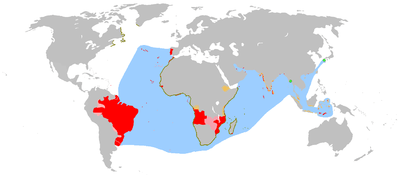Lusophilia
Lusophilia (Portuguese: Lusofilia) is the love of, or friendship or sympathy toward, Portugal and/or Portuguese things. The word derives from Luso- (representing Lusitania, an ancient Roman province corresponding to some areas of modern Portugal) plus -philia (Greek φιλíα, "affection"). The opposite sentiment is lusophobia.
Lusofonia
The Lusofonia or Portuguese-speaking community is an obvious source of lusophilia. This includes Portugal's former colonies and Portuguese expatriates worldwide. Both past and current cultural trends or fashions born in Portugal are often followed in such territories around the world by a considerable number of native residents. This includes an extensive demand for European made music, sports (particularly football), television and other media, websites and consumer products from Portugal. Good diplomatic relations and high influxes of immigrants from these former colonies to Portugal, and of Portuguese tourists and foreign direct investment in the opposite direction, helped to preserve or even revigorate lusophilia.
See also
References
|
|---|
| | North Africa |
|---|
|
|
15th century
|
16th century
|
|
| | | | Sub-Saharan Africa |
|---|
|
|
15th century
|
16th century
|
17th century
18th century
19th century
|
|
| | | Southwest Asia |
|---|
|
|
16th century
|
17th century
|
|
| | | Indian subcontinent |
|---|
|
|
15th century
16th century
Portuguese India
|
|
17th century
Portuguese India
18th century
Portuguese India
|
|
| | | East Asia and Oceania |
|---|
|
|
16th century
17th century
|
19th century
Portuguese Macau
20th century
Portuguese Macau
| • 1938–1941 | Lapa and Montanha (Hengqin)
|
|
- 1 1975 is the year of East Timor's Declaration of Independence and subsequent invasion by Indonesia. In 2002, East Timor's independence was fully recognized.
|
| | | North America and the North Atlantic Ocean |
|---|
|
|
15th century
|
16th century
|
|
|
| | | Central and South America |
|---|
|
|
16th century
|
17th century
18th century
|
19th century
|
|
| | |
|
